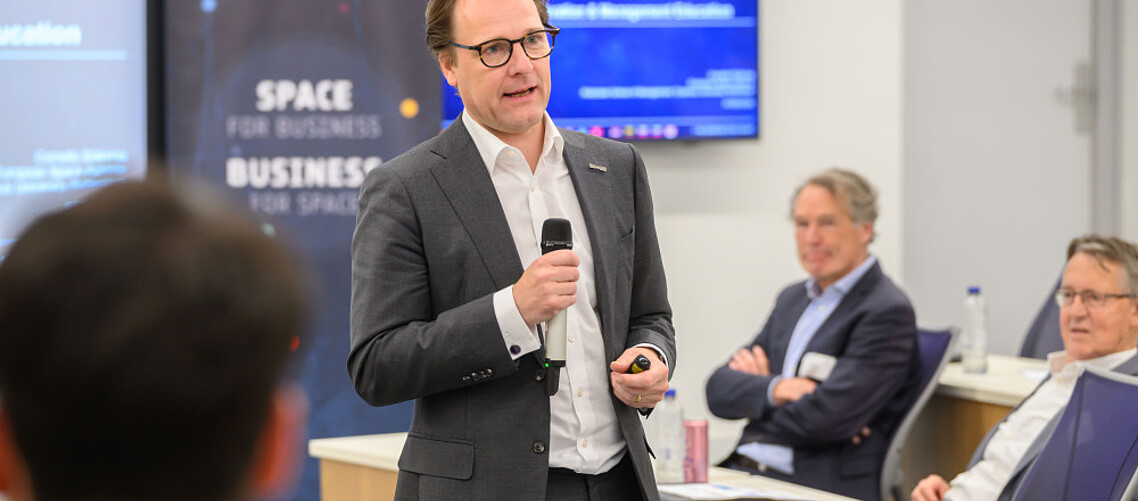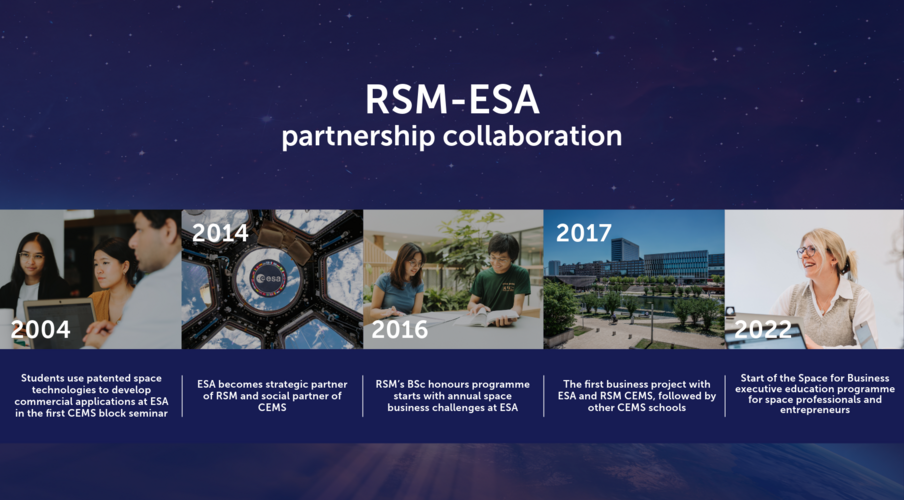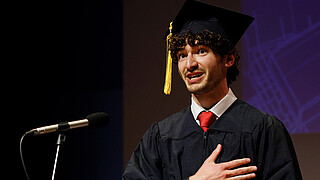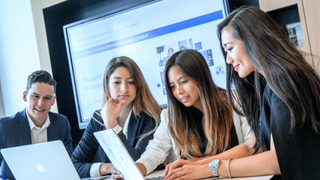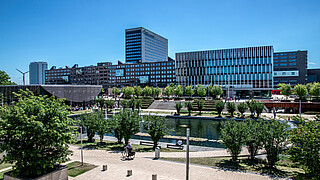New business ideas
The collaboration between RSM, the Global Alliance in Management Education (CEMS) and ESA has become an accelerator for bringing business management education into the space sector, and space into business management education. Nearly 300 projects have reached more than 2,000 students at RSM over the past 20 years, with participants coming from the International Management/CEMS programme, from RSM’s MScBA Master in Management, from RSM’s BSc honours track, and the RSM STAR study association. Additionally, students and business professionals meet ESA through numerous guest lectures at RSM and the executive education programme Space for Business.
The ingenuity of those who create space technology is tremendous, but there’s also an important role for business education in fostering new entrepreneurs and connecting them with scientists and engineers so they can shape the future together. This 20-year collaboration between RSM, CEMS and ESA has resulted in hundreds of business ideas – an excellent example of how young business leaders can help shape the future of the industry.
“ESA is a high-profile organisation that works on the future of mankind,” says Dr René Olie, academic director of RSM’s CEMS programme. “The innovativeness of the space sector and the fact that commercialisation and entrepreneurship increasingly become important makes it a natural fit for RSM.”
Anniversary symposium
In June, RSM, CEMS and ESA celebrated these 20 years of successful collaboration with an anniversary symposium, reflecting on the partnership journey so far, exploring the possibilities ahead, and discussing how business schools can shape the future of the space economy and commercialisation. Among the attendees were CEMS alumni, students and stakeholders from RSM, ESA and CEMS.
In addition to Eldering (who was presented with an RSM Distinguished Alumni Award in 2015 for his success in bringing technology into business and education), other speakers in the 20th anniversary event’s programme included Dr Dietmar Pilz, who explained how to run large technology projects with business knowledge; Philips Thomas, who gave insight into Europe’s current and future involvement in space exploration; Apostolia Karamali, who talked about stimulating international co-operation between Europe and ESA.
The business of rocket science
“It’s clear: space needs business talents,” says Eldering, explaining how the ESA block seminar took shape. “My mission is to engage business education and research with this cosmos of business opportunities. The obvious choice was to engage with CEMS, the Global Alliance in Management Education, as this international format is most reciprocal to an international organisation such as ESA.”
The idea for the first CEMS-ESA block seminar came in 2004 emerging from Eldering’s own management studies and an ESA-sponsored trip to French Guyana, South America in 2002, where he studied alongside engineering students who were captivated by the superstructure and launch site of the Ariane rockets. Eldering realised that he was more interested in the business operations that are needed to make this technology happen, so he talked to CEOs of the companies that were building and supplying the launch site. Studying the co-ordination of satellite companies, insurance companies, regional economic development agencies, and the local population and their businesses, he began to understand how space technology and business could interact and collaborate, and why business students should be a part of it.
20 years of innovation and entrepreneurship
Today, the week-long block seminar study project is managed by RSM and hosted by Eldering’s team at ESA’s establishment ESTEC, the European Technology and Research Centre, in Noordwijk, the Netherlands. Every year, among the 2000 specialists working at ESTEC, around 65 students participate in two block seminars, half of them from RSM and half from the other 33 CEMS partner schools.
The block seminars provide an opportunity to share ideas and network during this compulsory element in the international management education CEMS programme. Students are able to hone their creativity and consultancy skills as they learn about innovation and entrepreneurship in an increasingly important high-tech industry.
An accelerator in the space sector
In addition to bringing new space technology to people in business schools, business practitioners and policy makers, Eldering also brings innovation and business management principles to his colleagues at ESA through an HR talent development programme; it adds to the Agency’s real and sustained impact on Europe’s competitiveness in space business and policy.
Eldering notes: “Imagine that it’s possible to have in-orbit manufacturing of the highest-grade microchips, or transplant organs that are based on your own DNA – these come with logistic challenges and business opportunities. We could see fuel stations in space for suborbital transport vessels between Earth and in-orbit mooring stations, just like the shipping companies I encountered in French Guiana on my ESA study trip in 2002. My view is that all these ideas and technological advances need a sound business proposition. The future is extremely bright for the future business generation who are getting ready in university lecture halls to join the world of space-business.”
A reciprocal collaboration
A growing space economy means satellite and rocket-enabled technologies are becoming increasingly prevalent in terrestrial business. They drive a need for engineers and business talent – as well as a framework in which space as a business can flourish. “First we need rocket scientists to open up the gateway to space, then we need business professional to reap the benefits of space by creating a highway of commerce and business opportunities,” says Eldering.
As part of the set-up team for the first on-site ESA Business Incubation Centre in 2002 and 2003, Eldering has ushered the growth of the operation to 30 centres that support more than 220 start-up companies every year across Europe. “Fostering entrepreneurship means linking this massive network of business support professionals and market creators, with research and education in business administration.”
“The space industry needs to attract people with business acumen that can foster an entrepreneurial approach – we see this happening right now when we see the fluctuations in competitiveness between the world’s leading space nations such as USA, Europe, India and China.
“It goes both ways. This is an opportunity for ESA and business schools because the space industry presents a wealth of opportunities for research and study as well as a growth area for innovative business practices in a hugely competitive global market.
Bringing sustainability down to Earth
Working with the vastness of space makes very clear the fragility of humanity and how much we depend on nature and planet Earth. “We should challenge every business that engages with space to do more with less. The ‘old world’ of durability through maximising on energy and power at all costs is long gone,” explains Eldering. “Durability is now synonymous with sustainability, but it still has to be paid for, and this is where new business modelling comes in. This is why I’m so passionate to bring modern business talents into our ESA Business Incubation Programme.”
He admits his alumnus’ bias towards the quality of RSM students but stresses that his colleagues and the corporate players in the space industry are also impressed. “Often my engineer colleagues ask me if these are really business students, not engineers.”
He’s not surprised, however, that business students ask such in-depth technical questions. “Business management students are trained to be generalists amongst specialists, to be adept and to listen to the problem, and not to be complacent with their own solutions. At the same time, they are competent to recognise their own shortcomings in a particular specialism, and when to call in the experts.”
“I am so proud of RSM and CEMS students. I see their potential when working with them and I see my colleagues recognising this as well. They represent the future decision-makers, investors and policy makers. They represent the force for positive change in a growing space economy.”
